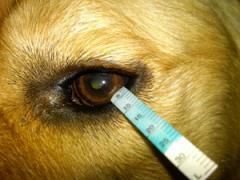Does My Dog Have Dry Eye?

Does My Dog Have Dry Eye?
This photograph of a dog’s eye shows:
- An emergency room snapshot of a ruler stuck in a dog’s eye.
- A very sad dog crying blue tears.
- A veterinarian testing for tear production.
If you guessed number 3, you are correct. This photograph shows a dog being tested for tear production. The paper strip, called a Schirmer tear strip, is placed in the eye for one minute. As the tears are absorbed by the special ruled paper, an eye-safe dye turns the paper blue as it is moistened by the tears. In normal dogs, the blue dye rises to between 15 and 25 millimeters over the course of one minute. Blue dye below 15 mm indicates the dog is producing inadequate tears. Lucky for this dog, he has normal tear production.
Why check tear production?
Inadequate tear production, dry eye or keratoconjunctivitis sicca has many causes and often the cause cannot be identified. Medications, infections, immune disorders and general anesthesia are some of the most common causes of dry eye.
Can dry eyes hurt my dog?
Dry eye is a serious disorder which can compromise vision, especially if left untreated. The lack of tears allows the normally transparent cornea to become thickened and opaque, leading to blindness. Corneal ulcers and bacterial conjunctivitis are other disorders occurring as a result of dry eye.
How can I tell if my dog is producing an inadequate level of tears?
Only your veterinarian can tell for sure using the Schirmer tear strips. But any time you notice your pet squinting, rubbing at her eye or redness, swelling and ocular discharge, dry eye is a possibility and a trip to your neighborhood veterinarian a necessity.
For more on dry eye treatment, click here.
________________________________________________________
This may also be found in the “Tales from the Pet Clinic” blog on WebMD.com.
For over a century, The Animal Medical Center has been a national leader in animal health care, known for its expertise, innovation and success in providing routine, specialty and emergency medical care for companion animals. Thanks in part to the enduring generosity of donors, The AMC is also known for its outstanding teaching, research and compassionate community funds. Please help us to continue these efforts. Send your contribution to: The Animal Medical Center, 510 East 62nd Street, New York, NY 10065. For more information, visit www.amcny.org. To make an appointment, please call 212.838.7053.


































